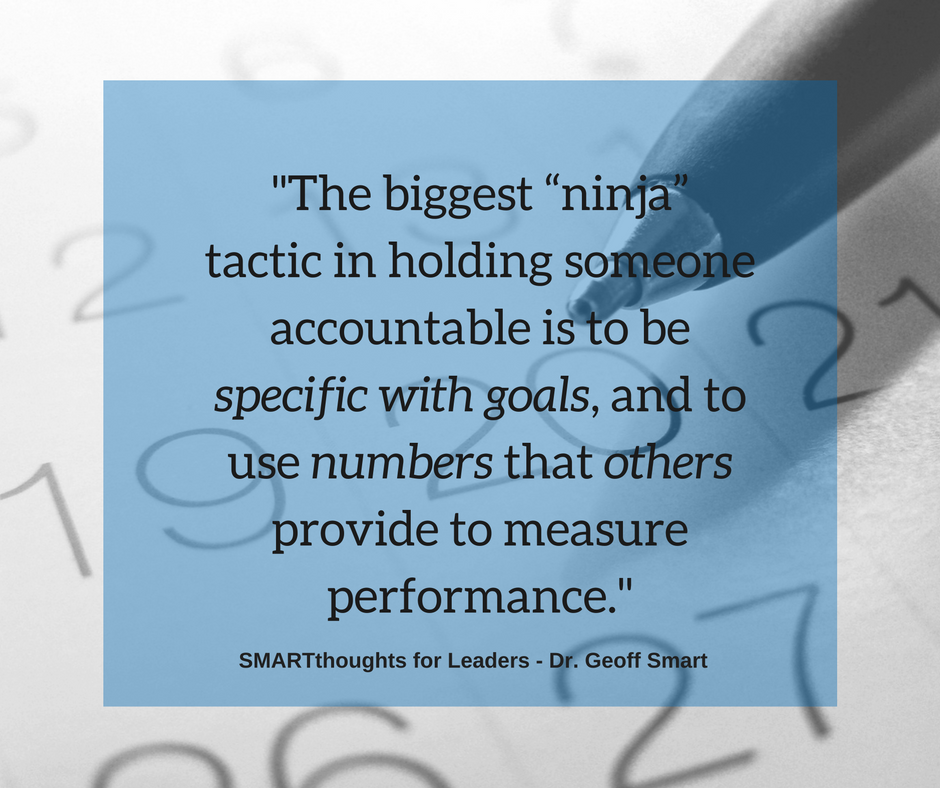Leaders struggle to hold people accountable. According to our research for Power Score, we discovered that only 8% of leaders are good at holding people accountable.
Why do so many leaders struggle to hold people accountable?
Because when you do it wrong, it stinks for everyone. Tension, stress, and hurt feelings, bad results, and a culture of defensiveness rather than a culture of performance and personal growth.
The biggest rookie mistake in holding someone accountable is to be vague with goals, and to use words that you provide to measure performance.
I was giving a keynote speech at a Fortune conference a few years ago. Jim Collins had just left the stage to a roaring standing ovation. He had made the case for being “disciplined” in managing people and following through on measuring performance. It made sense to the audience. Once I got on stage, I asked the audience a question, “How many of you have goals for your teams that are written down?” Only 10% of the hands went up!!!
How in the world do leaders plan to hold people accountable to achieve goals that are not even written down? Failure to write goals down leaves open so much opportunity for confusion— “I thought you wanted me to work on X!” And it makes it near impossible to hold someone accountable for delivering a result when you have failed to articulate the result you seek.
Great leaders don’t make their teams guess at what their goals are.
The biggest “ninja” tactic in holding someone accountable is to be specific with goals, and to use numbers that others provide to measure performance.
I remember in the early days of ghSMART (a leadership consulting firm), I struggled to hold a consultant accountable. She was brilliant and had great technical skill. But her client relationships were tenuous—she rarely called the clients proactively, didn’t follow up, and as a result clients did not ask her back to be their trusted advisor. One day, when I was a 25-year old CEO, clueless beyond words, I worked up the courage to hold her accountable. I wanted to coach her to improve her client management, to increase her client impact and to help her sustain a full portfolio of work.
I told her, “You need to improve your client relationships.”
She defensively said, “No I don’t. Clients love my work. The quality of my work is excellent.”
I said, “Well, one client told me that although he values your work, he feels you treat him like ‘processed cheese’ and that you rush to finish projects with him and then you move on to your next client project.”
She said, “Well I think the quality of my work speaks for itself.” Meeting over. Both of us left the discussion feeling frustrated.
This was a big failure on my part. I had not set specific, mutually-agreed on goals. And I was using vague words, which did nothing to help coach and develop, and did everything to anger my colleague.
One of my mentors gave me this advice — “Make sure you have clear goals, in writing, so your consultants know what ‘great’ looks like. Then have somebody other than you collect data on their performance. Then you can sit down as a coach to review their results vs. their goals.”
It was great advice. I started practicing it. And for the last two decades, I’ve given this advice to countless leaders. It still amazes me how many large and small companies fail to articulate clear goals for their managers and employees, and therefore struggle to hold people accountable.
My colleagues and I established very clear, numerical outcomes (I use the words goals and outcomes synonymously) in the form of scorecards. A great scorecard answers the question, “Who is supposed to do what by when?”
Our CFO began running reports on a) client satisfaction ranked by consultant over time, b) client revenue ranked by consultant, and c) % of revenue from happy repeat clients. And we chose to share the performance data openly with the whole firm.
Now the other leaders at the firm and I could sit down with a colleague, look at a highly objective report with numbers vs. goals, collected by a third party, and we could have a professional development discussion. This approach has worked significantly better than the “vague words I provide” approach to holding people accountable.
When you do it right, high performers will know they are performing, and they will keep doing what they are doing. And lower performers will know they are not performing well, long before anybody has to sit them down to have a conversation. Specificity with goals, transparency with results, objectivity with numbers, and regular follow-up are your tools for holding people accountable, and running your teams at full power.
If you think these tactics are useful, please download our free leadership tools SMARTtools for Leaders™.

Leave a Reply